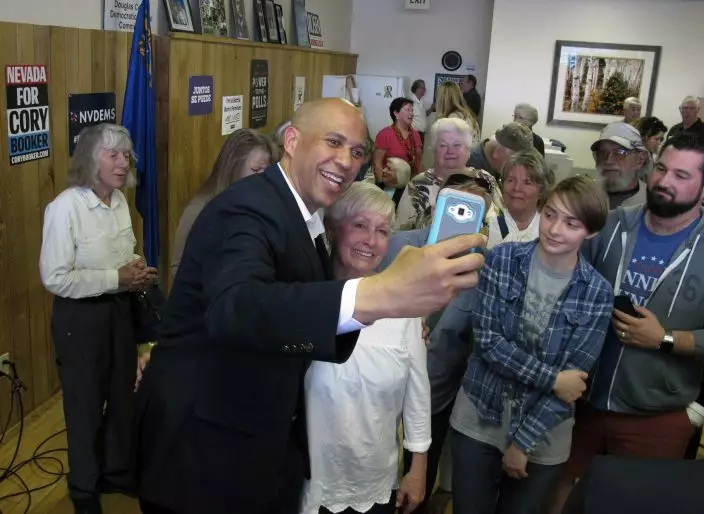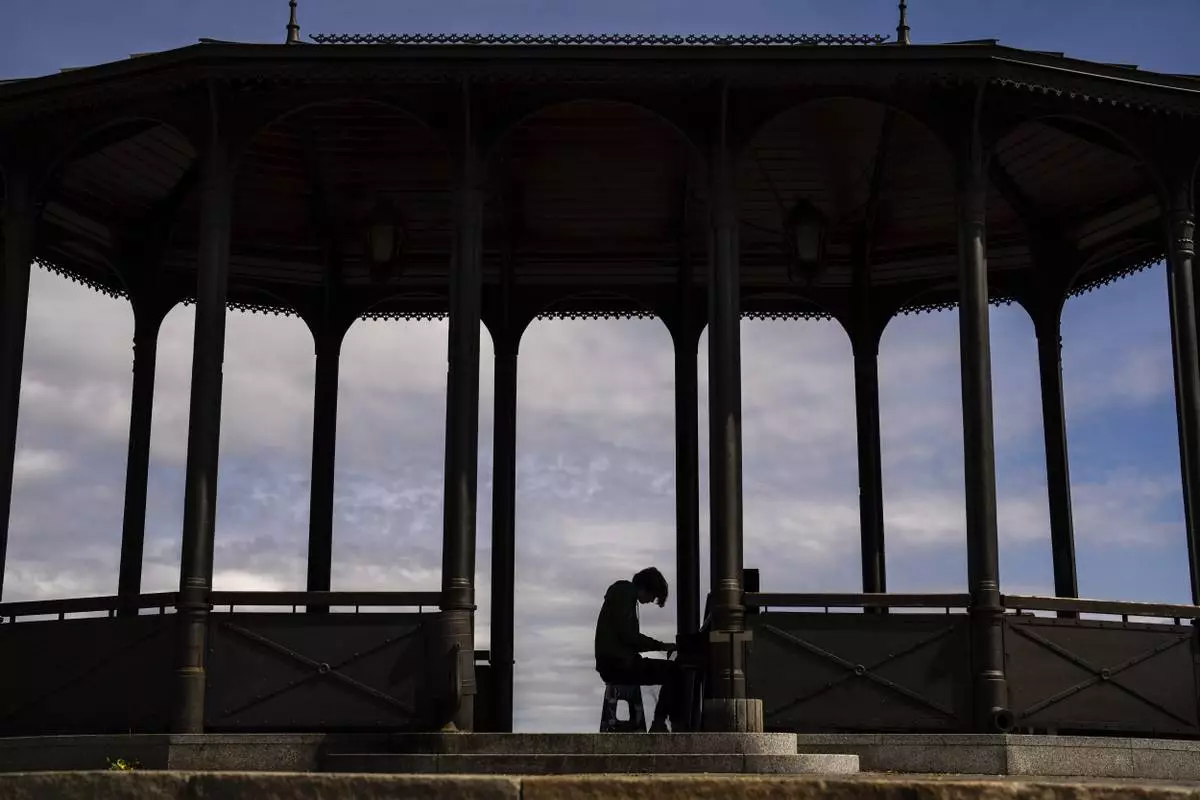Democrat Kimi Cole is tired of excuses from presidential candidates who say it's too expensive and time-consuming to visit areas of rural Nevada like her town of Minden, population 3,400.
To get there from Washington, D.C., however, would likely mean at least a seven-hour, multi-stop flight to Reno, followed by an hour's drive. It's a unique challenge for Nevada, which sits much farther west than the other two early voting states.
To overcome the logistical challenges and ensure those living in rural communities play a key role in vetting candidates, Cole told The Associated Press that she and other Nevada Democrats are setting up a series of virtual visits with the presidential campaigns.

Sen. Cory Booker, D-N.J., takes a selfie with a supporter following his speech to about 100 people on Friday, April 19, 2019, at the Douglas County Democratic headquarters in Minden, Nev. Booker became the first candidate running for president in 2020 to make a campaign stop in a rural part of the early caucus state. (AP PhotoScott Sonner)
They hope to launch the first series of online video conferences with the 2020 contenders within a month. It could be a nationwide model as presidential candidates expand the traditional campaign map to seek support in places where Democrats have struggled, including rural America.
"You can drive 300 miles and 400 miles (480 to 640 kilometers) across the state and you may not get in front of very many people," said Cole, chairwoman of the Rural Nevada Democratic Caucus. "I understand all that, and I'm respectful of all that. But doggone it, we have modern technology."
Cole said she's working with other organizers to ensure their internet connections can handle the virtual visits. The cyber-campaigning could give presidential candidates a chance to reach thousands of scattered Nevada Democrats whose votes they need to court to gain an advantage in a crowded field.

Sen. Cory Booker, D-N.J., talks about his presidential campaign during a speech to about 100 people on Friday, April 19, 2019, at the Douglas County Democratic headquarters in Minden, Nev. Booker became the first candidate running for president in 2020 to make a campaign stop in a rural part of the early caucus state. (AP PhotoScott Sonner)
"I know so many people, especially out in rural counties, that feel like they're not being heard, that they're not being represented," Cole said. "This is a step to meet in the middle."
The videoconferences allow rural residents to ask about issues like natural resources, water rights and gun rights that may not get as much attention in Las Vegas or Reno.
Judy Zabolocky, chairwoman of the Lyon County Democrats who lives in the small community of Dayton, said many Democrats in her county might have to drive an hour or more to Reno if they want to see a candidate.
"In the past years, if they're really, really hot on a particular candidate, they will make an attempt to go see them. But most of them don't," she said.
Nevada, which votes third in the U.S. on a Democratic presidential nominee, is already farther away than the other early nominating states.
In South Carolina, where most areas can be reached within a few hours' drive, candidates have made a point to visit rural areas. Iowa is much more spread out, but almost all the Democratic presidential candidates have made a point of hitting rural areas before its first-in-the-nation caucuses.
Cole said organizers are aiming to set up simultaneous video conferences in eight to 10 far-flung locations across Nevada. One after the other, Democratic presidential candidates would hop on a video conference and speak with a couple hundred people gathered in libraries or other community centers hundreds of miles apart.
At least six candidates have expressed interest in participating, including Massachusetts Sen. Elizabeth Warren and New Jersey Sen. Cory Booker, whose campaigns confirmed they have been in talks with Cole.
Andrew Yang, an entrepreneur seeking the presidential nomination, also has floated a novel technological approach to overcome limited time and resources. He told the Carroll Times Herald in Iowa last week that he's working to start campaigning virtually with a 3D hologram.
"Rural engagement via video conference strikes me as a great idea and something that candidates should do more of," said David Cohen, who served as Nevada director for Barack Obama's presidential campaign in 2007 and 2008. "Primary candidates need the exposure and Nevadans need to kick the tires. But they've also go to get out there to meet folks in person."
Nevada Democrats allocate their delegates based on congressional districts, giving those living in sparsely populated areas a prominent voice.
In addition to facilitating the virtual visits, Cole is working to persuade campaigns to visit rural Nevada in person. Booker on Friday will become the first candidate to make that journey, stopping in Cole's town of Minden during a three-day swing through the state.
Cole said she hopes it will set a precedent for other 2020 Democratic candidates.
"We want to meet you, and we want to hear from you. Ignore us at your own risk," Cole said.
Associated Press writers Alexandra Jaffe in Des Moines, Iowa and Meg Kinnard in Charleston, South Carolina, contributed to this report.










